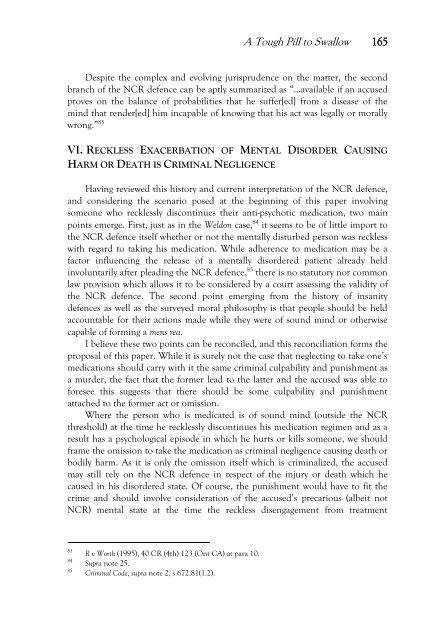Download PDF - Robson Hall Faculty of Law
Download PDF - Robson Hall Faculty of Law
Download PDF - Robson Hall Faculty of Law
You also want an ePaper? Increase the reach of your titles
YUMPU automatically turns print PDFs into web optimized ePapers that Google loves.
A Tough Pill to Swallow 165<br />
Despite the complex and evolving jurisprudence on the matter, the second<br />
branch <strong>of</strong> the NCR defence can be aptly summarized as “…available if an accused<br />
proves on the balance <strong>of</strong> probabilities that he suffer[ed] from a disease <strong>of</strong> the<br />
mind that render[ed] him incapable <strong>of</strong> knowing that his act was legally or morally<br />
wrong.” 83<br />
VI.<br />
RECKLESS EXACERBATION OF MENTAL DISORDER CAUSING<br />
HARM OR DEATH IS CRIMINAL NEGLIGENCE<br />
Having reviewed this history and current interpretation <strong>of</strong> the NCR defence,<br />
and considering the scenario posed at the beginning <strong>of</strong> this paper involving<br />
someone who recklessly discontinues their anti-psychotic medication, two main<br />
points emerge. First, just as in the Weldon case, 84 it seems to be <strong>of</strong> little import to<br />
the NCR defence itself whether or not the mentally disturbed person was reckless<br />
with regard to taking his medication. While adherence to medication may be a<br />
factor influencing the release <strong>of</strong> a mentally disordered patient already held<br />
involuntarily after pleading the NCR defence, 85 there is no statutory nor common<br />
law provision which allows it to be considered by a court assessing the validity <strong>of</strong><br />
the NCR defence. The second point emerging from the history <strong>of</strong> insanity<br />
defences as well as the surveyed moral philosophy is that people should be held<br />
accountable for their actions made while they were <strong>of</strong> sound mind or otherwise<br />
capable <strong>of</strong> forming a mens rea.<br />
I believe these two points can be reconciled, and this reconciliation forms the<br />
proposal <strong>of</strong> this paper. While it is surely not the case that neglecting to take one’s<br />
medications should carry with it the same criminal culpability and punishment as<br />
a murder, the fact that the former lead to the latter and the accused was able to<br />
foresee this suggests that there should be some culpability and punishment<br />
attached to the former act or omission.<br />
Where the person who is medicated is <strong>of</strong> sound mind (outside the NCR<br />
threshold) at the time he recklessly discontinues his medication regimen and as a<br />
result has a psychological episode in which he hurts or kills someone, we should<br />
frame the omission to take the medication as criminal negligence causing death or<br />
bodily harm. As it is only the omission itself which is criminalized, the accused<br />
may still rely on the NCR defence in respect <strong>of</strong> the injury or death which he<br />
caused in his disordered state. Of course, the punishment would have to fit the<br />
crime and should involve consideration <strong>of</strong> the accused’s precarious (albeit not<br />
NCR) mental state at the time the reckless disengagement from treatment<br />
83<br />
84<br />
85<br />
R v Worth (1995), 40 CR (4th) 123 (Ont CA) at para 10.<br />
Supra note 25.<br />
Criminal Code, supra note 2, s 672.81(1.2).














